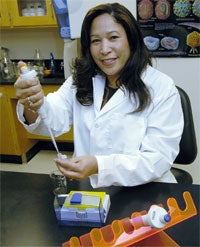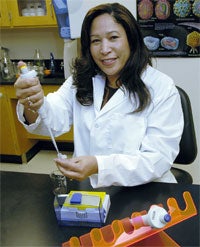 URI student merges Native American traditions
URI student merges Native American traditions with high-tech training in pursuit of biotech career
PROVIDENCE, R.I. — March 16, 2006 — The traditional Narragansett Indian culture plays a vital role in Wanda Hopkins’ daily life. She is on the board of the Tomaquag Indian Memorial Museum in Exeter and serves as treasurer of the tribe’s JOM Parent Education Committee. She enrolled her two children in the Narragansett’s Nuweetooun School in Exeter, and two of them continue to demonstrate their skills as traditional dancers during pow-wow season.
But Hopkins also has one foot in the high-tech world of biotechnology and hopes to soon land a job at pharmaceutical giant Amgen. She is nearing completion of her first year in the University of Rhode Island’s biotechnology manufacturing program.
“I don’t see a contradiction between Native American knowledge of Mother Earth and the ‘new world’ of biotechnology,” said the Hopkinton resident. “I view it as the world of science catching up with ancient wisdom. My ancestors tried to communicate the importance of life that existed in the wind, water, plants, etc. I was taught to respect Mother Earth and all of the creatures. We must coexist because life is in many things and we are interdependent in the natural world. I don’t know how the ancestors knew about life they could not see with the naked eye, but whenever I see life teeming in a drop of water under the microscope, I honor their wisdom all the more.”
It was her son Mack who, upon his graduation from URI in 2004, encouraged Hopkins to return to college after a nearly 20 year absence. “I was a full-time mom, but I was very involved in the whole educational process as I watched my children grow,” Hopkins said. “When I saw a story about the URI biotech program, I knew that was for me.”
Launched in 2003 at the URI Feinstein Providence Campus, the biotech manufacturing program features a rigorous curriculum that begins with two semesters of full-time study followed by a summer internship at a biotechnology company in the area. Following the internship, most students go to work full-time in the industry and complete their bachelor’s degree as part-time students.
“The best part of the program is that we do a lot of hands on learning that is very practical,” Hopkins said. “After every lecture we have a lab, so what we learn in the lecture we get to apply right away.”
Hopkins added that the coursework, which includes biology, chemistry, biotechnology methods, computer science and math, is very challenging and the pace is quite accelerated.
“When I first started the program, I thought my professors were speaking another language,” she said, “and now I know they really were. I’ve learned many new scientific terms and techniques for studying the world around me.”
To help her through the challenging program, Hopkins is pleased that she has a good support system: “a wonderfully supportive husband, who was the reason I was able to go back to school, and my mom, who just moved in with us and has been helpful in keeping our family life stable,” she said.
Beyond the support from her family, her fellow students also provide invaluable support. “Out of necessity, you need to communicate and interact with fellow students in the classroom and share information to get through the program,” Hopkins explained. “A lot of us have the same kinds of challenges with home life and work, and we’re able to support each other by listening.
“The program definitely fosters a great deal of unity among the students,” she added.
URI News Bureau Photo by Michael Salerno Photography

